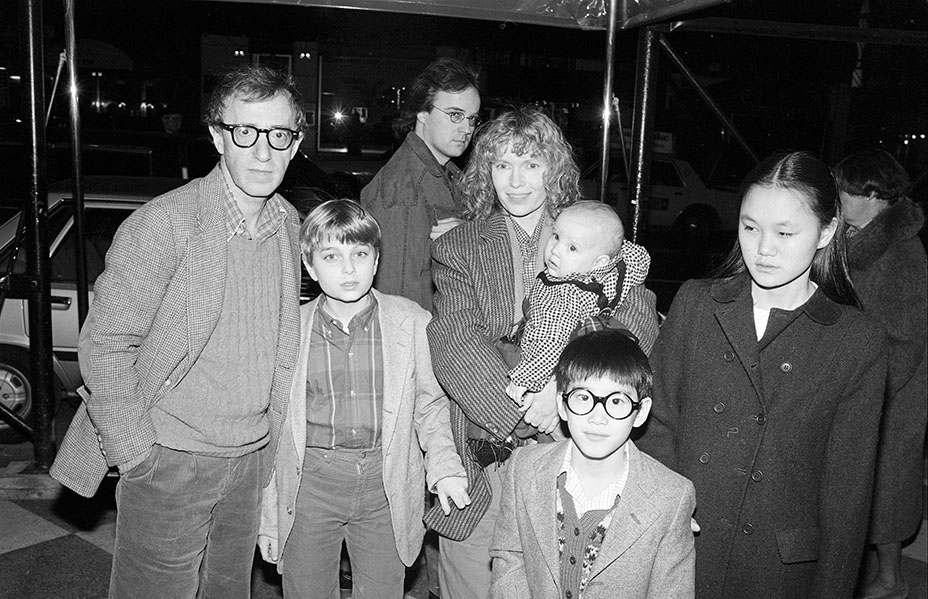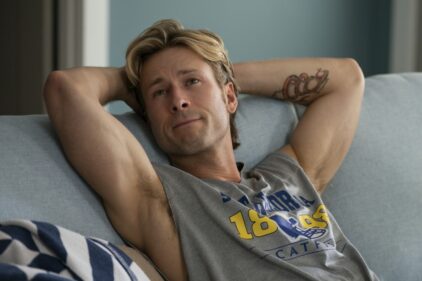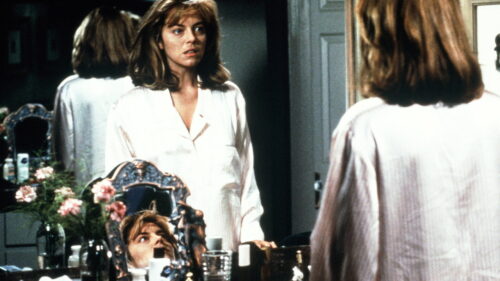I believe Woody Allen is one of the great American filmmakers.
I believe Dylan Farrow when she says Allen molested her as a child.
The two thoughts are not mutually exclusive.
But they are painful to reconcile.
Allen has been accused of sexually abusing Dylan, his adopted daughter with former girlfriend and leading lady Mia Farrow. Allen did pioneering work as a stand-up comic, TV sketch writer, screenwriter, movie actor, and ultimately screenwriter and director. His work will remain important no matter what else we may learn about his private life. But it has become increasingly difficult to balance Allen’s achievements against Dylan Farrow’s insistence that he sexually assaulted her while she was in his company and care.
Family members—including Dylan’s mother Mia and her brother (and Allen’s biological son), newscaster Ronan Farrow—have corroborated her account and added details of their own.
I had adopted a wait-and-see attitude about all this for years because, although there was a criminal investigation of Allen in the early ’90s, no charges were pursued. Another of the couple’s adopted children, Moses, switched allegiance from Farrow to Allen, telling People magazine, “I don’t know if my sister really believes she was molested or is trying to please her mother.” The exact nature of the events falls into the realm of the legally unknowable.
Still, I believe Dylan. On some level, I always did.
But Allen’s films meant so much to me that I wanted to prevent my warm feelings about his work from being contaminated by certitude about Dylan’s accusations.
That’s why I’ve been in a kind of denial about all this, for years.
Read Ronan Farrow’s extraordinary article in The Hollywood Reporter, written in response to the magazine’s May 4 cover story on Allen. “I believe my sister,” he wrote. “This was always true as a brother who trusted her, and, even at 5 years old, was troubled by our father’s strange behavior around her: climbing into her bed in the middle of the night, forcing her to suck his thumb—behavior that had prompted him to enter into therapy focused on his inappropriate conduct with children prior to the allegations.”
The idea that an entire family would engage in a decades-long conspiracy to defame and scandalize a mother’s ex-boyfriend, to the point of weaving an obsessively detailed fictional scenario that rivals “Lolita” in its density, even after the kids are out of the house and living independent adult lives, strikes me as absurd—especially when there’s nothing to be gained financially from doing such a thing, and the details are so gross, so humiliating, so deeply repulsive, that merely to speak of them invites others to define the speaker as well as Allen purely in terms of an alleged crime.
Mia Farrow would, I imagine, prefer to be known as an actress and activist. Ronan would prefer to be known as a television journalist. Everyone else in the immediate family would surely prefer to be known for whatever they do, or are, in their daily lives. And yet they have all willingly chosen to let themselves be defined as “people who have accused Woody Allen of child molestation.”
That’s a statement of priorities. That’s a moral statement. It’s saying, “The public’s perception of who I am, in all my complexity, is of secondary importance to me. What’s more important is that the world accept our account of what happened to Dylan.”
That’s extraordinary. There’s nothing comparable to it in Allen’s sphere, only dismissals of the Farrows as conspiratorially vindictive, weird paternalistic statements about his marriage to another of Farrow’s daughters, Soon-Yi Previn (some of which you can read in the Hollywood Reporter piece, which makes no mention of Dylan’s allegations), and talk about his work.
Woody Allen will still be a great American filmmaker no matter who he is, or turns out to be, as a man. After he’s dead, these allegations will become one more aspect of his life story, just as Norman Mailer‘s sexism and violence against women became part of his story after he died, something that can be viewed more neutrally, as one of countless facts that add up to a life.
But Allen’s work is not the subject of this piece, nor is that “artist and the art” argument that we have whenever we talk about Allen, Bill Cosby, Roman Polanski, or anyone else whose private life is tainted by scandal or crime.
This is certainly not an attempt to “prove” anything, as a lawyer might.
I’m talking only about my own personal feelings about Allen, which I summed up at the top.
Will I see new Woody Allen films? Sure, especially at press screenings. I might even pay for one, because I don’t think withholding, say, a few dollars from a man who’s already made millions over the years is going to “punish” him, and because financial rewards or penalties are just not the point of this for me (though I understand that they are for others, and I support such a decision if you think it’s right for you). He’s a major artist. I’m a critic. I need to keep track of what he does on film. It’s a professional obligation, and if I ruled out the work of directors, actors and writers I disapprove of personally, I’d be blacking out a fair chunk of cinema history.
Will I continue to review Allen’s new films and write about his old ones? Absolutely. This is not a court of law. I don’t have to recuse myself for having any particular feeling about Allen’s private life. I try to be upfront about disclosing external factors when responding to art. And on top of all that, nobody who watches movies or reads the news is unaware of these allegations, so there is no such thing as an unbiased take on Allen anyway. (Suggesting that a critic who has no strong emotional response to the allegations is somehow preferable seems specious to me anyway. We’re not Vulcans.)
I’ll strive to compartmentalize my belief in Dylan’s account while I review Woody Allen films that have nothing to do with the subject of parents and children, trust, sexual assault or anything in the wheelhouse of this awful story. If he makes a good movie I’ll give it a positive review, and if he makes a bad one I’ll pan it. I won’t bring the allegations into every review—unless the material seems to demand that kind of response, which is sometimes unavoidable with Allen, a biographically inclined filmmaker who keeps revisiting the same pet subjects and the same relationship configurations (including older man/younger woman—which pretty much guarantees that critics will reference the fact that his wife was once his girlfriend’s adopted daughter).
But I doubt I’ll be watching Allen’s earlier films again, unless I need to refresh my memory of them for an article about Allen, or some other filmmaker who referenced his work or learned from it.
And I’m not going to pretend to be unaware of or unaffected by knowledge of these allegations as I write about his work.
I don’t judge anyone who says they’ll continue to watch his films and patronize new ones. I completely understand the “separate the artist from the art” argument, as I’ve made it many times myself, while allowing for various complicating factors that prevent a one-size-fits-all response.
This is a personal decision. This piece is not a recommendation to anybody. It’s an attempt to describe my attitude toward a man who was once simply an artist but has become an issue.
His films have now become an unpleasant experience for me—sometimes mildly unpleasant, sometimes deeply unpleasant, because of thoughts about Dylan that intrude when, say, Allen is romancing teenage Mariel Hemingway in “Manhattan,” or when one of his characters makes a joke about child molestation (there are a staggering number of them, unfortunately). When I revisit Allen’s films, even genuine laughs and sighs are undercut by a lingering nausea about the accusations.
That magnificent shot of the hero and heroine of “Manhattan” sitting on a bench and looking at the 59th Street bridge used to just be beautiful to me. It was so beautiful, with that Gershwin music playing, that I have cried at the sight of it. It’s one of the most beautiful things I’ve seen in a film. But when I watched it again a couple of years ago, there was a mental asterisk on it. If you could have read the accompanying text, it would have said something like, “Quite a lovely image, too bad he’s a child molester.”
Such reactions mean that deep down, I must believe Dylan. That I’ve always believed her.
To suppress such reactions to Allen’s work, in the name of not “spoiling” my reaction to films I love, would be personally dishonest. I feel what I feel. You can’t just decide not to feel the way you feel. The human personality doesn’t work that way.
More importantly, trying to suppress that reaction would be tantamount to denying that Allen molested Dylan.
I can’t do that.
As a witness to, and survivor of, domestic abuse in childhood, I just can’t do that.
It’s not worth it to me, going through that. Not even for a couple of hours, or a few minutes.
I’ve gotten a lot of pleasure from Allen’s films over the decades, but they are not so important to me that I’m willing to deny what my gut tells me is almost certainly true, and deny my own experience, which affects how I treat people in real life, not just how I react to particular films and filmmakers.
So, Woody Allen has gone, in my mind, from “One of the great American filmmakers” to “One of the great American filmmakers, and probably a child molester.”
It’s a different lens through which to view a director’s work, that’s for sure.
But I didn’t do that to Woody Allen. He did it to himself.
I adopted a cool-headed (I hope) view of Norman Mailer. I did it with Mike Tyson, one of the great American boxers and also a convicted rapist and serial batterer and one-time mugger. I could do it with Paul Gauguin and Tupac Shakur and many other great artists whose private lives were filled with events and choices that would make us not want to be around them if they weren’t great artists—if they were just people who happened to live on our block.
I’ll find a way to do this with Woody Allen’s work, too.
It might make my response to his films more detached and analytical, perhaps colder in some ways, like the point-of-view of somebody studying a long-dead artist whose creative achievements and personal decisions occurred deep in the past, and are now a part of a bottomless collection of facts.
But I’ll do it.
It’ll take some time, and it will be tricky, and there will be missteps along the way, but I’ll do it.
I believe Dylan.
***************************************
ADDENDUM: I was surprised by how much attention this piece received, and somewhat taken aback by the number of readers who were of the opinion, essentially, “if you don’t approve of this artist, you should never write about them again.” As if it were possible to somehow “starve” an artist or celebrity of attention and “punish” them or make them go away.
I disagree with that. The role of the critic is to write about the culture. Artists produce that culture. I don’t believe in selectively deciding not to write about people for this reason or that reason. It is the opposite of criticism to think that way. It may be a perfectly wonderful other kind of writing, but I don’t think it can be called criticism. It’s more like a moral version of consumer advocacy, dedicated to recommending products of which one approves.
Cinema, television, literature, past and present, are all filled with important figures who are morally reprehensible, in some cases criminal. And I write about them. People make bad films, in some cases disgusting or depraved films, and I write about them, with a jaundiced eye, I would hope. Mike Tyson, who was convicted of rape and has a long history of criminal battery outside the ring, had a show on Broadway and remains a fixture on television and in films, and Norman Mailer continued to produce notable work decades after stabbing his wife. They were written about, and very few cases did reviews fail to mention the unsavory aspects of their character. You factor that stuff in when you write. Sometimes you are explicit, sometimes you are subtle, but you factor it in.
But deciding not to write about them is, I think, the equivalent of sticking your fingers in your ears and singing a happy tune rather than admitting the existence of someone or something that offends you.
This is my opinion. It is not fact. If you feel differently, good for you. But it’s not how I do this job.
It is also a mistake to assume that because you haven’t heard something horrible about an artist you like, that they have done nothing horrible. Many of the people you think of as morally upright probably have skeletons in their closet. Ask anyone who ever adored Michael Jackson because he loved children so much.
I offer this not to imply that it’s easy to separate the artist from the art when writing about the art. Or the career. It is difficult. Everyone who writes about culture struggles with it. And everyone is to some extent a hypocrite, including you, whoever you are. It’s helpful to keep that in mind when telling other people that they are doing it wrong. I tried to do that here, to the extent that such a thing is possible.
I never indicated that my personal solution here is the right one for everybody. The piece is meant to give readers who cared some insight into my feelings about this matter. And that’s all it is and was ever meant to be.












